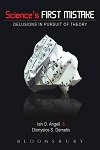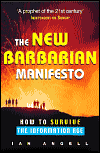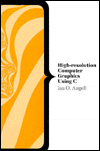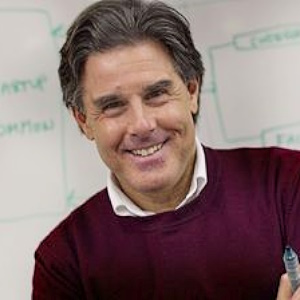Ian Angell Speaker Biography
Information and Communication Technology Guru
Ian Angell is a forecaster of the socio-political and business consequences of Information and Communication Technologies, with over four decades of research experience into the impact of computerization on society, business and finance. He was Professor of Information Systems at the London School of Economics for twenty-five years, where he taught courses on the socio-political, financial, and business consequences of Information and Communication Technologies, and of the Internet. On his retirement in September, 2011 he was made Professor Emeritus at LSE. He now divides his time between continuing his research into those topics, writing books and articles, consulting, and lecturing worldwide.
Books
In all Mr. Angell has published fifteen books, with translations into eight languages. As a prominent ‘futurologist’ his ideas routinely feature in the international press, radio and television. Particularly noteworthy are his views on “off-planet banking”, innovation, bureaucracy, and the future of oney, taxation, nationality, democracy, intellectual property, identity, and privacy.
Science’s First Mistake
Ian is highly critical of the careless use of ‘scientific method’ and statistics: not only their arbitrary application to business, but also their wider dominance in modernism. His analyses are described in the book Science’s First Mistake, which he co-wrote with Dionysios Demetis. At present publisher Edward Elgar has contracted them to write a book provisionally entitled The Technological Construction of Reality.
Financial Models
For the past four decades he has been predicting that the excessive use of mathematical models in the financial sector “would all end in tears”. Consequently, the Times tagged him “the Angell of Doom”, whereas the Independent on Sunday crowned him the “Prophet of the 21st Century”, and the Toronto Star dubbed him “the only intellectually honest new conservative”. The crash of 2008 ultimately proved him right, although the pseudoscience he warned about continues to this day.
Keynote Speaker
He is a stalwart of the international lecture circuit and has made nearly 150 presentations to major corporations – notably he was asked to step in at short notice to cover for the absence of President Mikhail Gorbachev for Stern Stewart in Chartes, and of Senator Edward Kennedy for Zefer at Harvard. On numerous occasions he has been invited to speak on a wide range of topics at major international universities and business schools, as well as to Senior Officers’ courses at Bramshill Police College, and on Officer Development at the headquarters of the British Army in Andover.
Systemic Risk
At the core of his ideas is the study of Systemic Risk, where most recently he focuses on the complexity resulting from computerization of bureaucracy. Angell has been particularly vocal in his criticisms of problems caused by Intellectual Property Rights Regimes (until his ‘retirement’ he was Chairman of Creative Commons – England and Wales), Invasion of Privacy (he was a Trustee of Privacy International), Anti-Money Laundering Regulations, and Taxation. He was very active in the debate over the now defunct UK national Identity card scheme. Angell played a lead role in the 2005 LSE Report on the UK scheme, which led to his team being singled out for attack by Tony Blair at Prime Minister’s Question Time over comments in the Report about the system’s security, which have subsequently proved unerringly correct.
Electronic Commerce
However, Ian Angell is best known for his pragmatic, down-to-earth and outspoken views on problems within electronic commerce and finance, on the future of money, and how IT is impacting the super-rich. Undoubtedly, his reputation is based mainly on his radical no-nonsense support of Capitalism in the Information Age, which he portrayed in his book The New Barbarian Manifesto, published in 2000. He has updated the work, this time with a co-author, the internationally renowned Canadian tax lawyer David Lesperance. Published in 2015, under the title The Flight of the Golden Geese, they consider the growing tension between governments and High Net Worth Individuals. Furthermore, in a debate held at the London Stock Exchange, with Sir Nicholas Montague the ex-head of H.M. Inland Revenue, Angell proposed the motion “All Taxation is Theft”; and at the 2008 City Debate held at The Lord Mayor of London’s Mansion House, he spoke in favour of short-termism.
Information Systems
Angell has acted as a consultant on managing information systems to a number of governments and the EU. He was invited to present his ideas to the Malaysian National IT Council, after which was asked to a one-hour private meeting with Dr. Mahathir Mohamad, the then prime minister. The CIA flew him to Washington to a ‘thought-leader’ round table; he joined an MI5 ‘stately home’ weekend in Oxfordshire to discuss IT and organized crime; and he went to Moscow at the invitation of the Russian Ministry of Science to consult on their brain-drain problem. He was a personal advisor to the Cabinet of Federico Mayor when the latter was Director General of UNESCO. He was also invited for one-to-one personal discussions with some highly prominent individuals, including George Soros at his estate in upstate New York, Bernd Pischetsrieder the then head of BMW at their offices in Munich, and Tony O’Reilly in Dublin. The CEO of Warner-Lambert once wrote to him saying that, because of a presentation he had made to W-L senior executives in Orlando, the company was changing its whole approach to Internet business.
Ian Angell Speaking Topics
The Flight of the Golden Geese
Professor Angell sets out his warning to the unsuspecting and thus unprotected High Net-worth Individuals that governments are about to “squeeze them until their pips squeak”.
Science’s First Mistake?
In this talk Professor Angell will give an overview of his latest book Science’s First Mistake: Delusions in pursuit of Theory, written jointly with his colleague Dr. Dionysios Demetis. He will point out the conceit of modernism that is grounded in the arrogance of scientific certainty. It is only human vanity that deludes us into believing that with scientific method, our intelligence would show us the truth about things: that we could be indisputable masters of all we survey.
Managing Computerized Bureaucracy
For three days in October 2007, the computerized reservations system of the MGM Mirage hotel and casino chain was “radically crashing”, making it impossible to manage their more than 15,400 hotel rooms. No guests could check in or out. When an inspector from the American Automobile Association (AAA) could not check-in at the Bellagio the hotel’s five-diamond AAA rating was put at risk: only 113 hotels of the 31,000 hotels across the United States, Canada, Mexico and the Caribbean have this rating. “Heroic” staff saved the day by working more than 12 hours a day and on days off to check guests in and out manually in order to achieve some level of business continuity.
Innovation: thinking outside the box
In this talk Professor Angell describes creativity and the process of innovation, focusing on what goes into making the next “greatest thing since sliced bread”. Apart from saying what innovation is, he will also talk about what it is not! He will stress that creativity is not about a few lone thinkers on individual journeys to their own personal “light bulb” moments.
The obsessive compulsive neurotic manager
Many managers are suffering from the madness of our age: ‘obsessive compulsive neurosis.’ These ‘methodolics’ believe that the world can be made into a tidy place when approached with tidy methods, implemented by tidy minds, using the icon of tidiness, the computer. So says Professor Ian Angell, who for the past twenty years has become increasingly concerned with the way computers are perceived in business, and in society in general. He has come to agree with Pablo Picasso, “Computers are useless. They can only give you answers;” and answers are simply not enough.
Beyond Good and E-ville
Professor Angell gives his forecasts for the effect of computerization and global communication networks on both political and commercial governance. He relates this to the central position of information systems within the whole spectrum of management, to consider ‘the nature of work’ in ‘the office of the future’ and the ‘enterprise of the future’. Angell finishes by initiating a debate on the likely impact of these emergent technologies on governmental and organizational strategies. He is adamant that all the institutions of the Age of the Machine will have to mutate in the Information Age or die!
Ian Angell Books

Science’s First Mistake: Delusions in Pursuit of Theory
Purchase Book
New Barbarian Manifesto: How to Survive the Information Age
Purchase Book
High Resolution Computer Graphics Using C
Purchase Book
Advanced Graphics on the VGA, XGA, Tiga Cards Using Borland C++
Purchase BookIan Angell Videos
Ian Angell Speaker Testimonials
"A prophet of the 21st century"
- | The Independent





